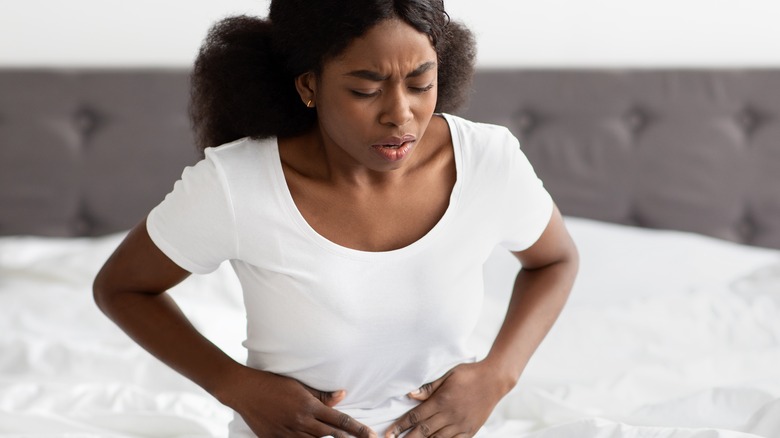If You Get Stomach Cramps, This Could Be Why
Have you ever felt increased pressure and tightening of the abdominal muscles radiating from the ribs to the hips, and with no way to control it? You may be experiencing stomach cramps or stomach aches. Whether they're mild or severe, stomach cramps can be awful to bear and may affect your daily routines. Anyone can experience serious abdominal pain at any age. According to Cleveland Clinic, stomach ache itself is not a disease but may indicate an underlying root cause in the stomach, intestine, liver, gall bladder, pancreas, or appendix.
Luckily, a stomach ache typically is not a cause for concern and can be eased with over-the-counter meds or easy home remedies (per Medical News Today). Some ways to ease your discomfort are to use a heating pad or eat a banana. Green tea, lemon juice, peppermint tea, and chamomile tea all have properties that can mitigate stomach pain. Per Medical News Today, it can be helpful to drink an infusion of digestive herbs such as fennel, mint leaves, and ginger.
If stomach cramps persist for more than a day and don't go away even after trying home remedies, you may want to visit a doctor for a medical diagnosis.
You may be overeating or have acidity
According to Healthline, about 11% of cases of abdominal cramps occur while eating. If you overeat in one sitting, your stomach might expand in size and put pressure on neighboring organs, leading to stomach cramps. The discomfort could last long enough until all the food is digested and the stomach returns to its original form. Overeating could also cause symptoms like diarrhea, bloating, or even constipation which further aggravates the pain.
Cramping may also be caused by frequent heartburn (aka acid reflux or dyspepsia). It's a feeling of discomfort when the food you consume doesn't get digested properly and as a result, is propelled back to the esophagus (via Mayo Clinic). The pain occurs in the abdominal region, along with a feeling of fullness and inflammation in the chest region; hence the name, heartburn.
You might have a reproductive issue
Certain reproductive infections and diseases could also lead to severe stomach cramps. If you have unprotected sex, you may be prone to common sexually transmitted diseases (STDs) such as gonorrhea, herpes, or chlamydia. According to Medical News Today, these STDs not only can cause unbearable abdominal pressure, they may be accompanied by changes in urine color, a frequent need to pee, and increased vaginal discharge.
People with tumors or cancerous growth in the uterus, prostate gland, or bladder may also have severe persistent stomach cramps. Additionally, Healthline warns that consistent pain all across the abdominal region that interferes with your routine tasks could be an indication of kidney stones. It is comparatively much worse and more intense, more like a stabbing pain that travels from the abdomen to the pelvic region. Cramps from kidney stones last as long as the stones pass through the urinary tract or are gotten rid of through surgery.
Uterine fibroids are another reproductive issue that targets more than 40 to 80% of the female population. These tumors target the uterus lining, leading to pressure build-up in the abdominal region. Uterine fibroids cause immense bloating and stomach pain that radiates to the lower back and hips (per Verywell Health).
You may be stressed out or missing loved ones
Let's face it: we have all played the "stomach-ache-no-school-today" card at least once in our childhood. Stomach ache is a common symptom of stress or anxiety. That's why many of us feel cramps or tight knots in the tummy the night before an exam, a new date, or a big interview.
Stress causes major hormonal changes. In particular, stress releases cortisol in your body, which is associated with the increased production of acids in the stomach. As a result, you may you might notice digestive issues, especially acidity and intense cramps. Healthline explains that stress-related cramps may be accompanied by nausea, gas, loss of appetite, diarrhea, constipation, and tightness in the abdomen as well.
Interestingly, being in love can also lead to stomach aches. Most of us are familiar with the feeling of "butterflies in the belly" after seeing our crush. According to Everyday Health, being lovesick can lead to increased heart rate, profuse sweating, dizziness, and decreased sleep, besides causing persistent cramps.
You might have period cramps or be pregnant
Painful menstrual cramps are among the most common problems faced by young women aged 30 years or under. It often feels like a consistent dull or stabbing ache in the abdomen and may radiate toward the legs. They occur because of uterine muscle contractions that at times cause the organ to push against neighboring blood vessels, temporarily blocking the oxygen supply and leading to pain (via WebMD). Also, if you have a hormonal imbalance or drink too many caffeinated products, your blood vessels could constrict and prevent adequate blood supply to the uterus, further aggravating the cramps.
Verywell Family notes that another possible reason for stomach cramps could be pregnancy. In the early days of pregnancy, your body adjusts to the changes taking place inside, making more room for the fetus to get comfy. As a result, the mother's organs press together, leading to painful cramps. You may feel sudden stretches in the abdomen or even persistent backaches.
You may be allergic or intolerant to some foods
Certain food intolerances or allergies may also lead to painful stomach aches. They are fairly common in the United States, affecting around 32 million adults (per Food Allergy Research & Education). Food allergy occurs when your body has a naturally adverse response to compounds in your diet, particularly protein. The body's immune system mistakenly identifies it as a harmful agent and begins creating antibodies to fight the compounds. As a result, you may experience nausea, breathlessness, diarrhea, and rashes, besides cramps, reports Cleveland Clinic.
On the other hand, food intolerance is when your body is unable to properly digest certain foods because of some particular compounds. About 20% of the people around the globe have some kind of food intolerance, according to Healthline statistics. You might notice the initial symptoms only after a few hours of consumption. While cramps are the most common sign of food intolerance, you should also look out for nausea, acidity, headaches, vomiting, dizziness, tiredness, bloating, and diarrhea.






